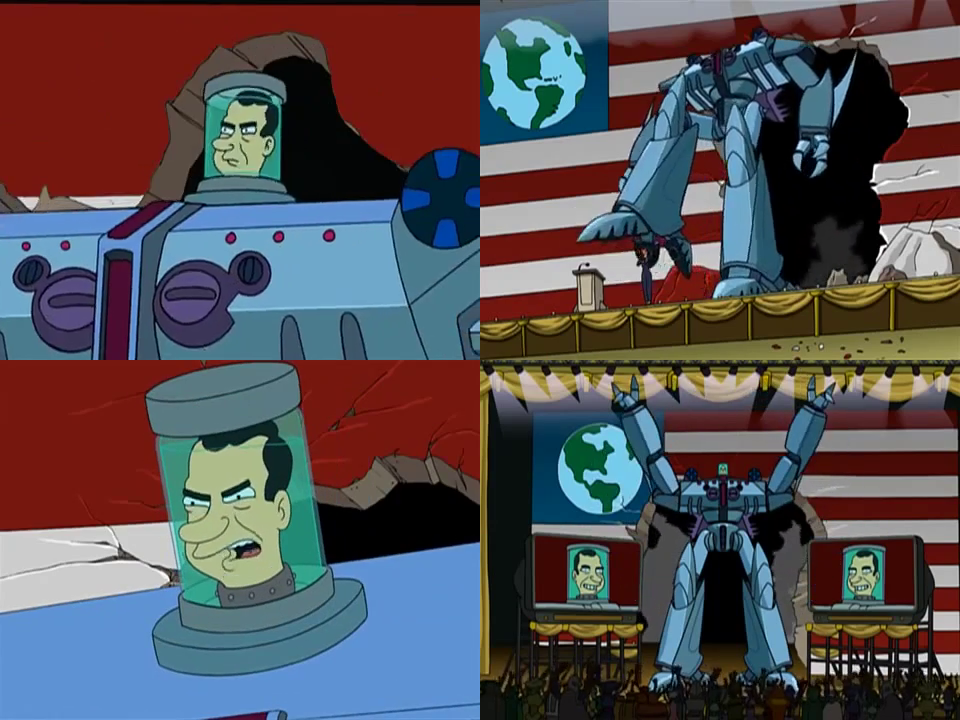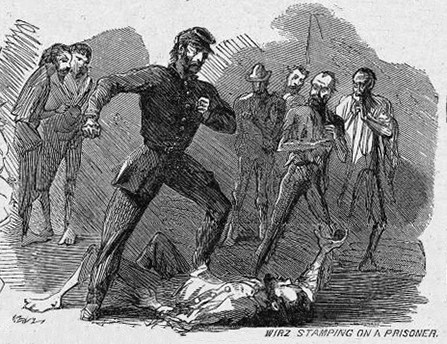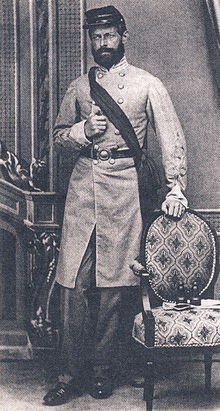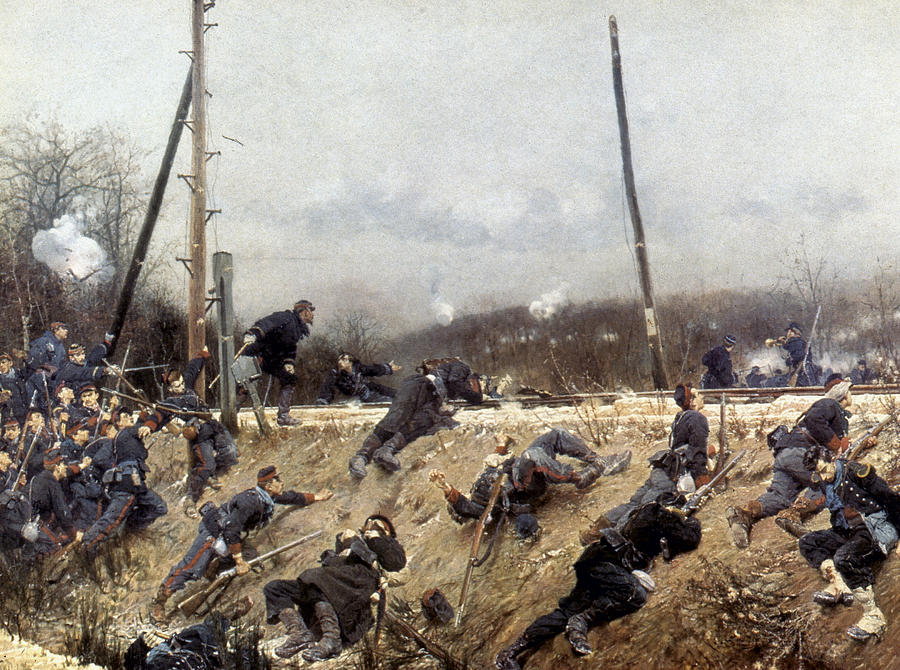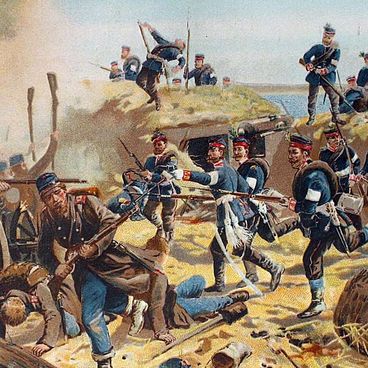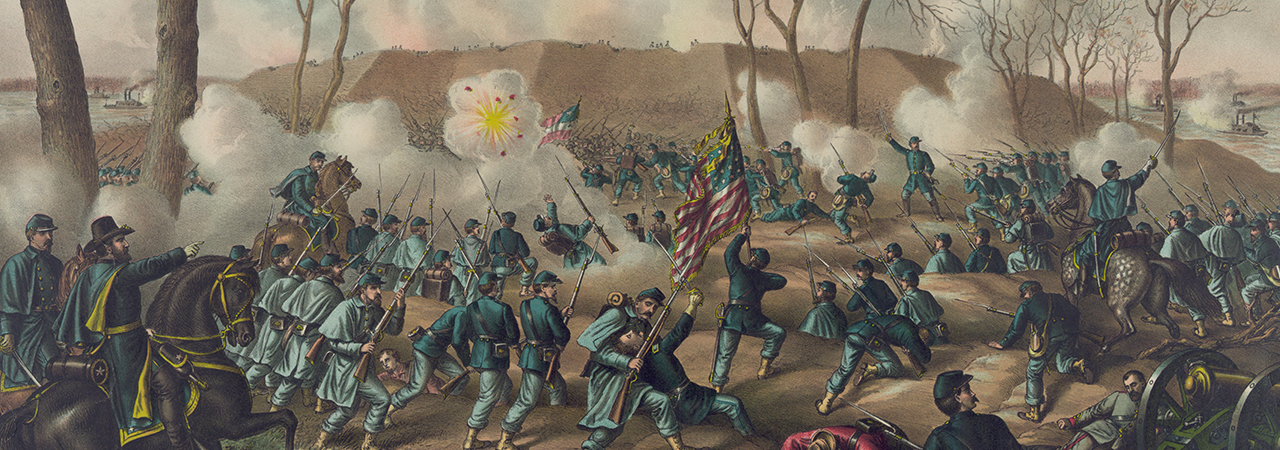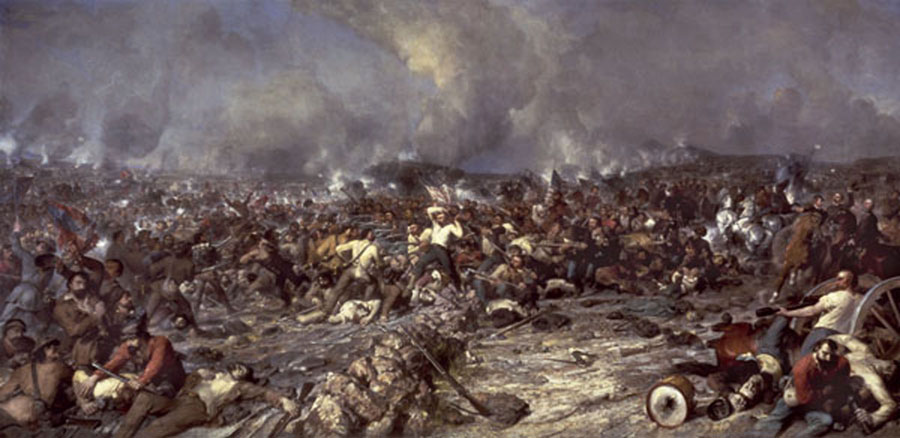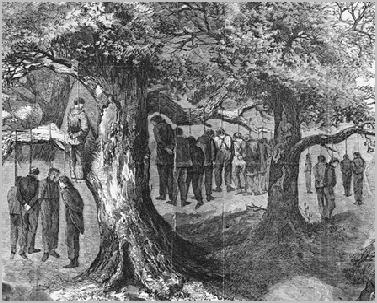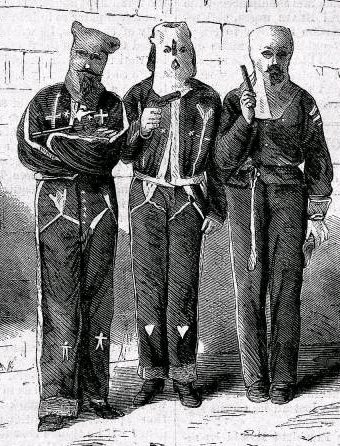The next chapter will be a revised Custer Origins and the other will be decanonized. I was so excited to write about him that I wanted to describe him up until before he entered politics, but the war has taken a different path from my initial ideas in that chapter. The new one will be mostly the same but will include a modified history of his battles during the Great North American War.
CHAPTER 35
BLOODY, BLOODY '59
Union troops emerge from their trench under heavy fire along the Blue Ridge Front
When the snows cleared, Texas entered the war on behalf of Georgia. The backwater Democratic Republic was still dominantly Hispanic, but the upper class had become increasingly white and Georgian born, so it was so no surprise that they came to Georgia's aid. The tiny Texas Navy sailed to the New Orleans to bolster defenses there, unloading some 20,000 troops and several hundred tons of ammunition and supplies to hopefully outlast a Yankee siege. Try as they might, Georgia could not gain the offensive, instead faithfully holding their lines but failing at every advance. Slowly, steadily, the ironclad ships of the Republican Union Navy came down the mighty Mississippi, and with them came hordes of troops on each bank. The Georgian general staff was surprised at the slow pace of the assault and determined that the Yankees might be more bluster than they let on and assured Prime Minister Towns that New Orleans was prepared for any eventuality. This was a sore mistake, as they would soon find out.
During the brutal, ferocious winter of 1858-59, the opposing sides seemed to follow an old-school European style winter truce as a gentleman's agreement. Navy Group I, out of Port Halifax, harassed the coast of Virginia and Georgia, but that was about the extent. This was actually a ruse, however, allowing the Union Navy Group II out of Boston to sweep into the Caribbean as silently as possible and shock the independent Republic of Cuba with a huge overnight invasion on January 18, 1859, assaulting Havana within the day and cutting all communications off from the island. The Republic of Cuba was caught so off guard that almost half the Cuban Army was captured or executed in their sleep. The anti-Catholic Union Army was under orders to not desecrate or burn Catholic institutions while the war was on, and the occupation was very polite and businesslike. Slavery was finally abolished forever in Cuba. However, resistance fighters were promptly executed, no quarter given. By late February, running on a strict timetable, an invasion of Jamaica was also underway, with no small help from the black revolutionaries there who were paid off to open their ports and gates to the Union Navy. Now, Georgians woke up in March with Cuba and Jamaica under Union occupation and looming just off their coast. Lincoln's Anvil was revealed, and he was determined to batter the South senseless between the Hammer and Anvil.
The Confederation of the Carolinas, meanwhile, were coming to fulfill the terms of the Union-Confederation Non-Aggression Pact. Overnight on March 28, the Confederation lashed out at both Virginia and the Carolinas. Declaring a "separate" war on Virginia and Georgia so as to not be seen as direct Union allies, the Great Southron War (as Chancellor James Polk was calling it) was underway. Polk had several very clear objectives to achieve victory: retake West Carolina ("Boone"), hold of Georgia until the Union could beat them into a corner, and humiliate Virginia in any way possible. Later, as the first offensives were going great, Polk would start grand plans of a potential "Confederacy of the South," with a post-War Georgia and Virginia in ruins and gladly accepting Carolinian occupation rather than Yankee.
Virginian militiamen flee before advancing Carolinian troops near Norfolk
The first thing the Confederation did in their stunning surprise attack on Virginia was to immediately slug their way toward Norfolk and Newport News, the Virginian industrial heartland. In a shocking repeat of the Cuba War, Norfolk was burned to the ground as quickly as possible and Newport News constantly bombarded with Union supplied heavy artillery. As Potentate Early raged over "Carolinian backstabbery" and struggled to get his forces into position to fight in both North and South, another Carolinian army, under Wade Hampton III, was on the offensive into Boone. The Virginians had built fortifications after the Cuba War, but these were know decrepit and many were unmanned, their garrisons fighting against Legate Generals Sherman and Selkirk in Kentucky. This provided a virtual field day for the Confederation troops, as they quickly overran everything in sight with minimal casualties. Almost all the enemies they faced were just simple militia, some of whom were of dubious loyalty to Virginia. For decades, many Boone citizens had still considered themselves West Carolinians and adored Andrew Jackson and the "Ol' Moon and Stars," and this heritage ran deep. Thousands of Boonesians rallied around Hampton III's invading army and called for the restoration of Confederation rule. A civil war broke out, with neighbor turning against neighbor and father against son. But by mid-Summer, most of Boone had been captured, restoring West Carolina and bringing meaning back to the Western Star on the Carolinian flag. This was the breakthrough the Union had been waiting for. Now they steamrolled over the Mississippi coastline of West Carolina before handing it over to the Confederation, restoring their port on the river. Polk was elated.
This breakthrough in early August crushed both Virginian and Carolinian morale, with the Georgian defenders along the Mississippi breaking and falling back to Fort Davis, Mississippi, and New Orleans. This worried Georgia, who feared Fort Davis would crumble and New Orleans would be lost. Georgian General Manfred Abbey Jones was basing his plans off captured intelligence and rallied all the forces he could to defend Fort Davis from a coming assault by Legion IX, out of Lewis City, Osage. Legate General Thomas McCray was in command of Legion IX and desperately wanted to launch a full assault on Fort Davis, one of the most defensible locations in the South. However, he dug in smartly to wait it out. If he launched an assault on the city and it failed, then it could open up the Union rear to a massive attack from behind, potentially jeopardizing the attack on New Orleans. So instead, he simply dug in and was determined to keep General Jones busy.
This was bad, very very bad for Georgia. Meanwhile, in the north, Sherman took complete control of Kentucky. The South was crumbling. Sherman announced a plan of "Barrage and Burn" and decreed that any cities which did not submit to Union rule would receive brutal retaliation and the burning of everything they held dear. He was very serious, too, and he lit several Kentucky locales ablaze for attempted insurrection and so thoroughly destroyed the towns that no one ever even attempted to rebuild them. They were forever lost to history.
Next, Legion X, shortly to become one of the most infamous units of the Union Army, arrived on the outskirts of the greater New Orleans region and found themselves facing unbelievable opposition from not just the Georgian and Texan troops there but also from local citizens determined to not let the control of the Mississippi pass entirely into Yankee hands. In response, Legion X, under Legate General George McClellan, began bloody assaults on nearby villages, burning Catholic churches and torching plantation houses. The local slaves, beat bloody by the Bourbon Brigade, stood up once more and welcomed the Union army in jubilation. McClellan announced that all the slaves were now free and could stand up to their former masters and take up arms. Thousands joined "McClellan's Volunteer Brigade" and eagerly looked forward to the final destruction of New Orleans. This in short time became the Free Negro Army of the Union.
As could be imagined, this did not sit well with the rest of the South, or the Confederation of the Carolinas. The war-torn nations were now just barely containing a full black revolution. The Confederation had just barely recaptured West Carolina in time before rioting and slave insurrections had begun. This frustrated Polk immensely, who desired to unify Athens, Georgia and possibly southern Columbiana under his country's rule. Newport News and Norfolk flew the Moon and Stars, but back home slaves were flying the flag of the AFC Church and taking up arms "in the name of Jehovah and President Lincoln." The Union assured the Confederation that they were by no means backing this rebellion, but suspicions remained high.
It was at this time, around early September that a freed slave from Maryland known as the Reverend Aaron Burr Douglass had descended from the north with an AFC Bible in one hand and a rifle in the other. Riding a fast black horse, he galloped across the countryside of Virginia proclaiming "The Emancipation has come! Negro men of Virginia stand up, stand up you free men!" As he went from town to town, he became known as the black Paul Revere. Following in his wake was Lincoln's Hammer, having finally broken through Robert E. Lee's Army of Northern Virginia and now steamrolling toward Richmond at a steady pace, ravaging the countryside as they went. This breakthrough had been achieved by Field Marshal Jenkins meeting up with Legate General Sherman. Sherman had left some men behind to guard what was left of Kentucky and then crossed into Columbiana to hit Lee from behind, breaking the stalemate there. An initial successful hold at Charlottesville made Lee confident he could withstand the sneak attack, but soon his men were just growing too exhausted to fight facing both north and south. Making matters worth, Virginian General Tad Wilson and his entire force of some 10,000 reinforcements were slaughtered in the east at Tappahanock. With Potentate Early fearing a total sacking of Richmond was nigh, Lee received orders to fall back and regroup in Richmond.
Reverend Aaron Burr Douglass
When Lee arrived in Richmond he found a total scene of mayhem and disorder. The slaves there had been told that the Union was coming to free them and they had revolted against the government, taking up arms and overthrowing the Virginian House of Burgesses. The Second Slave Insurrection was underway. President Early was nowhere to be found. This stunning turn of events forced Lee to make a decision. He had to decide whether to crush this black insurrection, which would almost certainly stall him enough for Jenkins and Sherman to hit from the rear, or he could take what forces and supplies were left in the city and retreat to Petersburg to make a last stand. If he could hold out till winter and after the fall of New Orleans (which would consume a massive amount of Union resources), he might be able to sue for peace and maybe retain Columbiana and perhaps Westsylvania. He could assume power as Potentate and abolish slavery once and for all (Lee was a lifelong anti-slavery figure anyway, though he mostly kept his thoughts to himself out of respect for his nation). This might be enough for the Union to agree to terms. He also had to worry about the Confederation coming up from the south, although he was unaware the slave revolt had spread to their nation as well. He decided to fall back to Petersburg. His army, now about 150,000 strong still, might be able to make a go of it, and for once Lee found himself praying profusely for a harsh winter.
The Army of Northern Virginia on the retreat to Petersburg
Sherman's men charge the rear of Robert E. Lee's Army of Northern Virginia
At last, September 20, 1859, arrived. It was a sunny morning when the Sack of New Orleans began. Yankee ships fresh from the Caribbean slammed into the port, finally eliminating the Georgian and Texan ships there once and for all. The Union Marines came storming into town, slaughtering every Southron soldier they could find. Up north, General McClellan was coming with Legion X. After the most intense artillery shelling of the war, the Battle of New Orleans was truly underway. The defenders of the city knew within an hour that defeat was certain. As Prince Alfonso fled the city through the last available escape route to the east, Heinrich Wirz was fearful that the rebellious slave prisoners in his prison would take terrible revenge if released, so he systematically went through and killed every single prisoner in his cells. Over 4,000 black men and women were massacred, shot down from behind iron doors. As Wirz was fleeing the city himself that night, he was captured by a Union platoon and thrown into a pen with other Georgian officers. All around him, he saw New Orleans falling apart. Houses lay smoldering. Bodies, both soldier and civilian, charred and bloody, strewn as far as the eye could see. It was like the Apocalypse had come to New Orleans. In the distance he heard a Union band play "We Are Coming Father Abraham." Union troops were blasting down statues of great Georgian citizens and burning the green-white-red flag of the Republic as they grew drunk of pilfered beer and whiskey. He knew, at last, the jig was up. It was at that moment when a massive Georgian counterattack began. It was midnight, September 21. The Georgian Army, now personally led by Prince Alfonso, was attacking from the east, while a surprisingly large force of Texans rode in from the southwest, sabers shining in the moonlight, hollering like demons. In the ensuing chaos, the drunk Union army was sent reeling, the Georgian prisoners were set free, and Wirz vanished into the night. The worst war criminal of the entire conflict was now free as a bird. He stole civilian clothes, shaved his beard, and blended in with the thousands of refugees fleeing the city.
The Texans assault Union-held New Orleans
By morning, the counterattack had ground to a halt as McClellan regained control of his drunken troops. He personally led a flanking cavalry assault that slammed into Alfonso's men, who were forced to retreat. He also was now aware of Wirz's war crime at the Hotel Bourbon. The Legate General then gathered 4,000 prisoners of war at the docks of the city and ordered his men to press upon them with bayonets. The helpless prisoners, their hands tied, could not swim properly. Those who could managed to keep afloat were shot. Some were taken by the alligators for food. He announced that any further butchering of slaves would be met with an equal number of dead Southron POWs. The city watched with horror as the waters of New Orleans turned red with Georgian blood. Legion X had reached the next level of infamy. From now on, the names of McClellan and the Tenth Legion struck fear wherever they went. This horrific punishment for the massacre at the Hotel Bourbon emboldened slaves across Georgia to take up arms. The Second Slave Insurrection was now also well and truly underway there. Prime Minister Towns declared that any and every slave who rebelled would be killed on sight. He also ordered the executions of 20 captured Union officers, most notably Milo Miles II, son of the famous Reverend.
Execution of the 20 outside Savannah, Georgia
This entire debacle was unheard of in modern history in its pure evil and genocidal frenzy since the bloodiest days of the Reign of Terror in France. The world was mortified by the horrors taking place in North America. But Robert E. Lee would find his prayers answered, and devastating early winter set in October. Richmond and New Orleans had fallen, but Petersburg held strong and Georgia was regrouping. The war would last another year, and 1860 would be no better than 1859. Heinrich Wirz would helm his "Riders of the Storm" terrorist brigade and strike fear into the heart of the Union, Robert E. Lee would lead a daring defense of Petersburg and attempt to sue for peace, Burnin' Sherman would strike again, a fallen Potentate Early would find himself asking for safe passage into the Confederation, and the world at large would be introduced to the legendary George Armstrong Custer....
